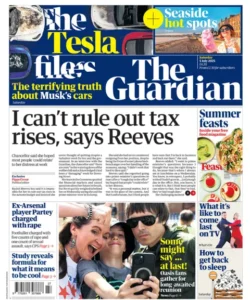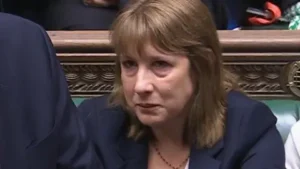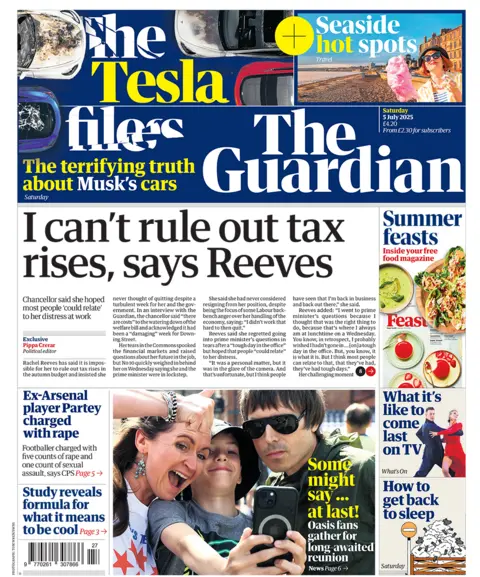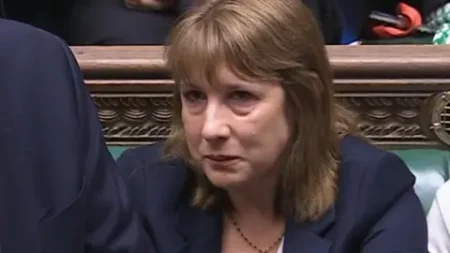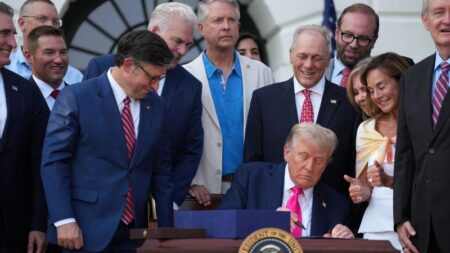In recent news, key headlines reveal a mix of political commentary and cultural events, sparking conversation among various demographics across the UK. The dual narratives breaking forth from the articles involve Chancellor Rachel Reeves’ concerns regarding potential tax increases and the much-anticipated reunion of legendary band, Oasis.
Primarily, Rachel Reeves has recently expressed fears surrounding tax turmoil in an interview with the Guardian. She mentioned that it was impossible to rule out tax rises in the upcoming autumn budget. The Chancellor, indicating the economic pressure the government is under, acknowledged during her discussion that there are significant costs associated with altering the welfare bill. This admission came after a particularly emotional week, where she was seen visibly upset in the Commons. Reeves underscored that she remains committed and has no intention of resigning despite the challenges faced at Downing Street, stating, “there are costs” to revamping existing financial policies.
Building on this narrative, various publications echoed similar sentiments about Reeves’ potential move to raise taxes. For instance, the Daily Express hinted that middle earners might face substantial income tax hikes, while also suggesting that Value Added Tax (VAT) and National Insurance rates could be adjusted to address a glaring £40 billion shortfall in governmental funding. These predicted tax adjustments reflect the government’s reaction to increasing fiscal pressures and the growing economic disparity affecting a large segment of the population.
As the tax concerns garner attention, a captivating cultural event simultaneously dominates entertainment news: the reunion of Oasis at a concert that attracted 70,000 fans. According to reports from the Daily Mirror, the Gallagher brothers rejoined on stage, electrifying the audience with their long-awaited return. Liam Gallagher, addressing the crowd, declared, “Yes beautiful people, too long,” marking a joyous moment for both fans and the band members after years of speculation about a reunion due to the historic tensions between the brothers.
The media’s excitement around this remarkable comeback contrasts sharply with the political turmoil concerning Reeves and increased taxes. The Times noted that while the forthcoming tax hikes might be less severe compared to those of the previous year, Reeves faces the daunting task of generating tens of billions more. There are even whispers in Westminster suggesting that tapping into pension savings could be a part of her strategy to plug the financial gap.
The ongoing political discourse does not solely revolve around Reeves. For example, Conservative leader Kemi Badenoch criticized the Labour Party’s leadership, particularly targeting Sir Keir Starmer, accusing him of a “year of lies and U-turns.” Her remarks come alongside coverage of various figures within the political arena, including Fiona Phillips, who recently shared her experience living with Alzheimer’s disease.
In addition, the discussion of political figures extends to former Prime Minister Boris Johnson, who advised his party to ignore figures like Nigel Farage. Johnson’s insights were shared during an exclusive interview, reflecting a broader strategy he perceives as beneficial for party direction.
Meanwhile, pop culture continues to hold its place beside politics, with Oasis’ reunion overshadowing many of the grave discussions in the news cycle. The Sun characterized Oasis’s comeback performance as “historic,” appreciating the nostalgic revival that struck a chord with music enthusiasts. The Daily Star echoed the sentiment, stating how fans were “mad for ’em,” capturing the vibrancy and energy of the event.
In summary, amidst the ongoing discourse about tax increases and political turbulence in the UK, the reinvigoration of cultural warmth through the likes of Oasis’ reunion serves as a poignant reminder of the power of music and community joy. This juxtaposition between pressing fiscal concerns and celebratory moments highlights the multifaceted nature of contemporary societal experiences in Britain today.

